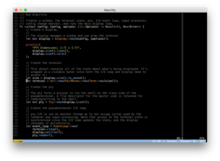Alacritty
 | |
 A screenshot of Alacritty running Vim | |
| Original author(s) | Joe Wilm[1] |
|---|---|
| Developer(s) | Kirill Chibisov, Christian Dürr[2] |
| Stable release | 0.14.0[3] |
| Repository | |
| Written in | Rust |
| Operating system | macOS, Linux, Microsoft Windows, FreeBSD |
| Platform | x86-64, IA-32 |
| License | Apache Software License 2.0 |
| Website | alacritty |
Alacritty is a free and open-source GPU-accelerated terminal emulator focused on performance and simplicity. Consequently, it does not support tabs or splits and is configured by editing a text file. It is written in Rust and uses OpenGL (for performance).[4][5][6] A similar terminal emulator that uses OpenGL is kitty.
History
[edit]Joe Wilm announced Alacritty in his blog on 6 January 2017. He describes it as "the result of frustration with existing terminal emulators. Using vim inside tmux in many terminals was a particularly bad experience. None of them were ever quite fast enough". He found urxvt and st difficult to configure and criticized their "inability to run on non-X11 platforms".[1]
With the release of version 0.2.0 in September 2018 Alacritty gained support for scrollback.[7]
In version 0.3.0, released in April 2019, Alacritty entered beta stage and support for Windows, text reflow, and clicking on URLs was added.[8]
In version 0.5.0, released in July 2020, a mode with vi keybindings for searching and copying text was added.[9]
In version 0.6.0, released in November 2020, a new Ctrl+C binding to cancel search and leave vi mode was added.[10]
Features
[edit]Alacritty supports true color in addition to the standard 16 ANSI colors.[11]
Alacritty explicitly does not support tabs or splits because similar functionality can be achieved with a terminal multiplexer or window manager.[12][13]
Configuration
[edit]Alacritty is configured by editing a template file in TOML format.[14]
See also
[edit]References
[edit]- ^ a b Wilm, Joe (2017-01-06). "Announcing Alacritty, a GPU-accelerated terminal emulator". jwilm.io. Retrieved 2020-07-28.
- ^ "Alacritty Open Source Project on Open Hub: Contributions Listing Page".
- ^ "Alacritty Version 0.14.0". 23 October 2024. Retrieved 25 October 2024.
- ^ Senthil Kumar Palani (2019-10-29). "Alacritty – A Lightweight And Blazingly Fast Terminal Emulator". OSTechNix. Retrieved 2020-07-27.
- ^ angeloma17 (2020-03-18). "Alacritty the fastest terminal emulator for Linux". OSRadar. Retrieved 2020-07-27.
{{cite web}}: CS1 maint: numeric names: authors list (link) - ^ Morelo, David. "Top 7 Best Linux Terminals – Linux Hint". Retrieved 2020-07-27.
- ^ Wilm, Joe (2018-09-17). "Alacritty now supports scrollback". jwilm.io. Retrieved 2020-07-28.
- ^ Dürr, Christian (2019-04-07). "Alacritty Version 0.3.0 Release". Archived from the original on 2020-07-28. Retrieved 2020-07-28.
- ^ Dürr, Christian (2020-07-31). "Alacritty Version 0.5.0 Release". christianduerr.com. Archived from the original on 2020-08-01. Retrieved 2020-08-01.
- ^ "Release Alacritty Version 0.6.0". GitHub. Retrieved 2020-12-19.
- ^ Beaupré, Antoine (2018-03-30). "A look at terminal emulators, part 1". LWN.net. Retrieved 2020-07-28.
- ^ "GitHub - alacritty/Alacritty at v0.4.3". GitHub.
- ^ Kili, Aaron (2020-06-05). "Alacritty – A Fastest Terminal Emulator for Linux". TecMint. Retrieved 2020-07-28.
- ^ "Alacritty". alacritty.org. Retrieved 2024-10-03.
